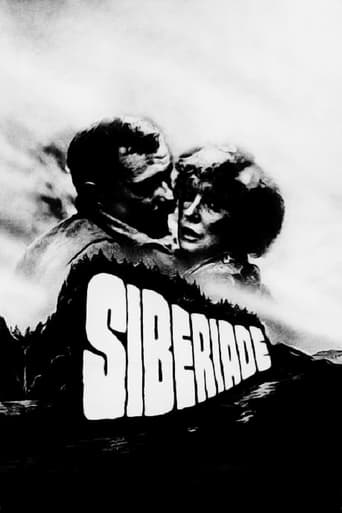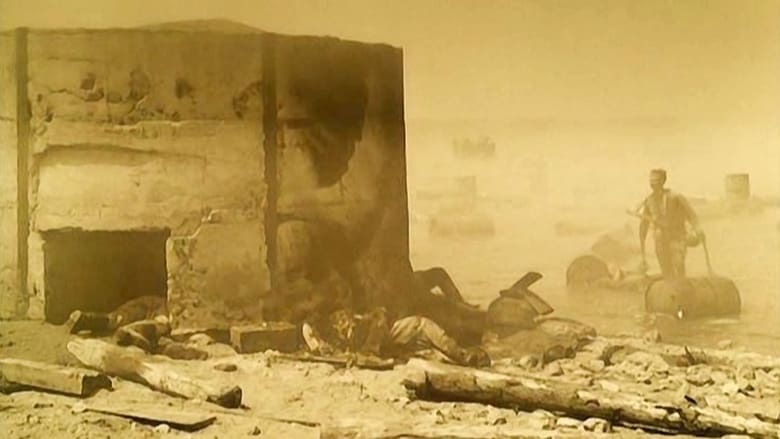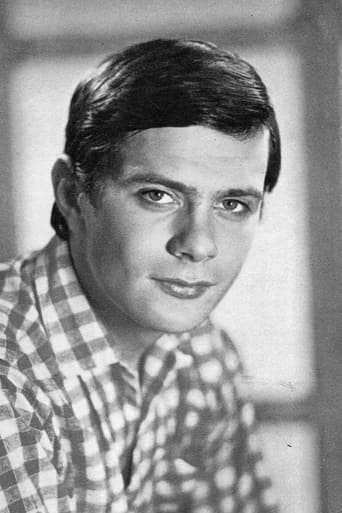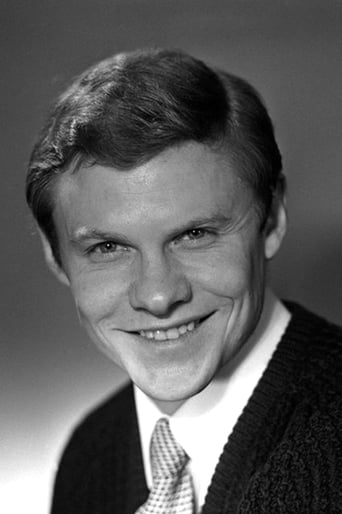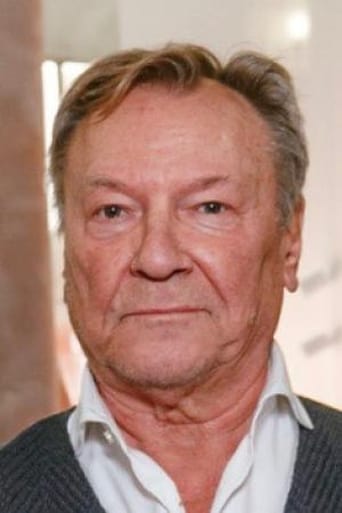Siberiade (1979)
The story about a very small god-forgotten village in Siberia reflects the history of Russia from the beginning of the century till the early 1980s. Three generations try to find the land of happiness and to give it to the people. One builds the road through taiga to the star over horizon, the second 'build communism' and the third searches for oil.
Watch Trailer
Free Trial Channels
Cast


Reviews
It's fun, it's light, [but] it has a hard time when its tries to get heavy.
Instead, you get a movie that's enjoyable enough, but leaves you feeling like it could have been much, much more.
This is a must-see and one of the best documentaries - and films - of this year.
This is a small, humorous movie in some ways, but it has a huge heart. What a nice experience.
This film is probably a master piece. To summarize the history of Russia and the Soviet Union in some four odd hours is in itself a miracle. But what's more it concentrates on Siberia and it follows one little village, Elan, in this region, and in this village essentially three generations of the Ustyuzhanin family, in fact Afanasi, the grand father, then Nikolai the father and Aleksei the son, as opposed to the other family in the village, the Solomins. The first family are the poor ones, the underlings before the revolution, the others are the top family. The revolution of course transforms these relations and we follow the lives of these three men essentially in their village, when they are there since they are often rejected, or they just go away, and then they come back. Dramatically.Afanasi is the only one who does not come back. He is always there and lives alone with his son and no wife.Nikolai comes back as a Soviet officer, a Communist cadre and it is dramatic because he had been thrown away at the beginning of the revolution and his paramour, from the other family, had escaped from the village to find him and follow him. It will be a difficult situation since she will be burned to death by the white Cossacks during the civil war after the revolution. He comes back with his young son in the 1930s and is killed by the other paramour of his wife, the one she left behind. Aleksei is sent to an orphanage, then on one visit to the village and his relatives a recruiting unit at the very beginning of the war against Nazi Germany accepts his enlisting, though he is slightly too young, and he will be a hero in the war, saving his captain all by himself. But in the 1960s he comes back as a master driller to drill for oil in his village because he knows there is some: he discovered it with his father when he was a kid when they marched into the marsh known as the Devil's Mane and there oil was oozing out all over the place and they managed to set it on fire, accidentally. Aleksei though wants to leave after a while, with the woman he had taught how to dance when just under 18 before he enlisted, and it is when he finally can go and is going to go, alone because the woman refuses to follow him, he goes say goodbye to his drilling mates and it is then oil is struck and starts bursting out. But it gets on fire for some unimportant reason and the derrick falls and traps one man. All the others go and Nikolai manages the situation to save that man, but Nikolai is caught by the fire and dies.But the film is a lot more important than that. It is a real film about history. You cannot force history to do something it does not want to do because you have to work with people and people do not necessarily want to change and you have to convince them. It may take three generations to move from the superstition about the Devil's Mane to the acceptance that the village is going to be completely transformed by that oil, and the most dramatic war possible in the meantime after a very dramatic and heroic revolution.The film then shows how at the beginning of this political revolution Nikolai was naïve and thought it was easy to make people do what they did not want to do, and he is killed just because his rival in love refuses to follow him and kills him. It fails because of some private business and affair, a love story that had not gone the way one of the lovers wanted. Trite, and yet history is also the result of such capricious and unpredictable elements. It will take thirty years and one generation for what was then possible in the 1930s to become a reality in the 1960s.And in the 1960s we are no longer speaking of that kind of romantic revolution Nikolai had in mind. Aleksei and the other oil drillers around him are confronted to the stubborn desire of the central authorities in Moscow to develop the country and to decide in Moscow what is best for everyone and the small village and the country around is going to become the largest man-made sea with the largest hydroelectric dam and factory on the Volga. It is a pure miracle that makes oil burst out of its underground lair on the very same day, killing Aleksei, as the central committee of the Communist Party or some other bureaucratic authority like this one is meeting to take a decision in favor of the dam. The events stop the dam project in its shoes and in its trail. Unluckily, and Konchalovsky knew all about it in 1979, that was the last moment when history was right against the bureaucrats. After that the USSR entered a very dark time when bureaucracy was the only possible authority and initiative from people was discouraged and even choked, and stagnation started, leading finally to regression and the fall of the USSR. We feel that end the director could not know under the open discourse about the heroism of this Aleksei. [. . .] I must reckon it is not easy to find that film in DVD. I got the US edition in NTSC in Russian with English subtitles. But it was worth it.Dr Jacques COULARDEAU
This is one of the films I most regret having set my interest on to decide to watch it. Four and a half hours of a story running through several generations of a small Siberian village, which just can't be less interesting, moving and appealing no matter the point of view you want to look at it: epic, sentimental, historical, or all at once, which seems to have been the pretension of the director, failing completely and pitifully in his vain attempt. A loose thread of familiar and personal stories intermingled with historical events which are unable during more than four painful hours to drag your attention into them just for five minutes. Not a single character is developed in a way that you can feel any emotion or at least some interest in his/her whereabouts. But there is some epic in the film: the number of senseless, histrionic scenes which make you plead "please stop this once and for all!!!". The reason why I watched this film was that other film by director Konchalovsky is actually among my all time favorites: Runaway Train. After having watched Sibiriada now I wonder if they are the same person or I mixed up names or something.
Siberiade is a magnificent epic. The story takes place mostly in the Siberian village Yelan, near which large deposits of oil lie. Two generations of villagers get caught up in turbulent times, when there was expansion in the Orthodox Civilization. The 1979 film is all about the characters. Well-known Soviet actors were cast in the leading roles, including Oscar winner Nikita Mikhalkov, Natalya Andrejchenko and Vitaly Solomin. Their losses are truly emotional yet they also go through periods of exaltation. The revolution brought hope but difficult struggles followed too. The cinematography by Levan Paatashvili captures the beauty of Siberia's wilderness in a simple but well done manner. Black & white footage of heroic periods in Russia's 20th century history bridge the eras in the characters' lives. Director Andrei Konchalovsky wasn't afraid to show a few uneasy scenes, and there's even a bit of female nudity. Yet his direction is effective and he succeeded in telling an absorbing epic of an interesting time in Russia's history. The film is known for Eduard Artemyev's memorable electronic score. The score was even released internationally, and I heard a piece of it in CNN's Cold War (1998) documentary. Siberiade won the Special Grand Jury Prize at the 1979 Cannes Film Festival, and I highly recommend seeing it.
It is a story of Siberian village people from the beginning of 20th century till the 60ties. It is about passion and feelings, about Russian soul, and very romantic. This movie IS NOT action packed, it flowes slowely. In second part one can find great songs - Russian romances. It is much more better than Doctor Zhivago. The director of this movie moved to America and made Runaway Train for example.

